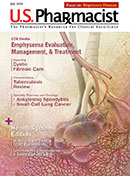A new study from Brigham and Women’s Hospital and Harvard Medical School–led researchers notes that anticoagulants are recommended for thromboembolic protection in patients with AF, but that can be difficult with the impaired coagulation balance in liver cirrhosis, making bleeding or thrombotic events more likely.
In an article in the Annals of Internal Medicine, the researchers compared the safety and effectiveness of apixaban, rivaroxaban, and warfarin—all of which have shown benefit for preventing major ischemic events with some increased bleeding risk, in patients in the general population with AF and cirrhosis.
The population-based cohort study used two U.S. claims data sets—Medicare and Optum’s deidentified Clinformatics Data Mart Database—from 2013 to 2022. The participants were patients with cirrhosis and nonvalvular AF initiating use of apixaban, rivaroxaban, or warfarin.
The primary outcomes were defined as ischemic stroke or systemic embolism and major hemorrhage (intracranial hemorrhage or major gastrointestinal bleeding).
The results indicated that rivaroxaban initiators had significantly higher rates of major hemorrhagic events than apixaban initiators (rate differences [RD], 33.1 per 1,000 person-years [PY]; 95% CI, 12.9-53.2 per 1,000 PY; hazard ratio [HR], 1.47; 95% CI, 1.11-1.94) although there were no significant differences in rates of ischemic events or death. “Consistently higher rates of major hemorrhage were found with rivaroxaban across subgroup and sensitivity analyses,” the authors pointed out. “Warfarin initiators also had significantly higher rates of major hemorrhage than apixaban initiators (RD, 26.1 per 1,000 PY [CI, 6.8 to 45.3 per 1,000 PY]; HR, 1.38 [CI, 1.03 to 1.84]), particularly hemorrhagic stroke (RD, 9.7 per 1,000 PY [CI, 2.2 to 17.2 per 1,000 PY]; HR, 2.85 [CI, 1.24 to 6.59]).”
The researchers wrote that their study was limited by nonrandomized treatment selection, but concluded, “Among patients with cirrhosis and nonvalvular AF, initiators of rivaroxaban versus apixaban had significantly higher rates of major hemorrhage and similar rates of ischemic events and death. Initiation of warfarin versus apixaban also contributed to significantly higher rates of major hemorrhagic events, including hemorrhagic stroke.”
The content contained in this article is for informational purposes only. The content is not intended to be a substitute for professional advice. Reliance on any information provided in this article is solely at your own risk.






